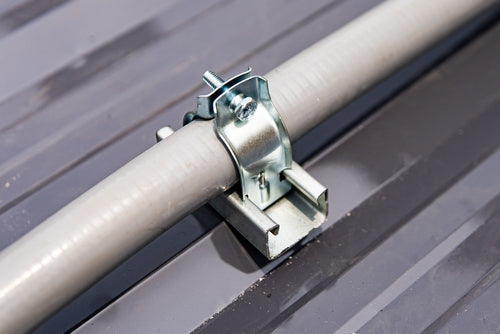When working on plumbing, HVAC, or industrial piping projects, choosing the right fastener used in securing pipes is crucial for both safety and efficiency. Pipe fasteners play a vital role in holding pipes in place, reducing vibration, and preventing damage to the system. The wrong choice can lead to leaks, misalignment, or costly repairs, while the right one ensures a secure, long-lasting installation.
Introduction to Pipe Fasteners
Pipe fasteners are essential components in construction, manufacturing, and maintenance projects. They are designed to anchor pipes to a fixed surface—such as walls, ceilings, or floors—while accommodating movement caused by temperature changes or system operation. From residential plumbing to large-scale industrial pipelines, the right fastener ensures that pipes stay in place without compromising performance.
What are Fasteners for Securing Pipes?
A fastener for securing pipes is a device or hardware component specifically engineered to hold piping systems in place. These fasteners are typically made from durable materials like stainless steel, galvanized steel, copper, or high-strength plastics to withstand environmental conditions, weight, and operational stress. Depending on the application, fasteners may be designed to allow slight movement or to hold pipes firmly in a fixed position.
Common Types of Fasteners Used in Securing Pipes
Different types of fasteners are available, each designed for specific pipe sizes, materials, and installation requirements. Here are the most commonly used options:
Pipe Clamps
Pipe clamps are versatile and widely used for securing both metal and plastic pipes. They consist of a circular or semi-circular bracket that wraps around the pipe, with screws or bolts for tightening. Clamps are ideal for applications where pipes need to be fixed in place but also require occasional adjustments or maintenance.
U-Bolts
U-bolts are shaped like the letter “U” with threaded ends. They are commonly used to attach pipes to flat surfaces or to secure them to other structural components, such as beams or walls. U-bolts are strong, easy to install, and suitable for heavy-duty applications like industrial piping or marine environments.
Pipe Straps
Pipe straps are simple, flat pieces of metal or plastic that curve around the pipe and are nailed or screwed into place. They are cost-effective and perfect for lightweight pipes, such as those used in residential plumbing. While not as heavy-duty as clamps or U-bolts, pipe straps are quick to install and suitable for securing small-diameter pipes.
Hangers and Supports
Pipe hangers are designed to suspend pipes from ceilings or beams. They are commonly used in commercial buildings and industrial facilities where piping runs overhead. Hangers may come with adjustable rods to allow precise leveling and alignment, helping maintain proper slope in drainage or HVAC systems.
Specialty Pipe Fasteners
Specialty fasteners are designed for unique applications, such as high-temperature pipelines, vibration-prone environments, or corrosive settings. These may include cushioned clamps, insulated hangers, or fasteners with anti-vibration features. Specialty fasteners help extend the lifespan of piping systems by addressing specific environmental or operational challenges.
How to Choose the Right Pipe Fastener
Selecting the correct pipe fastener depends on several factors:
-
Pipe Size and Material – Larger, heavier pipes require more robust fasteners like U-bolts or heavy-duty clamps, while smaller pipes may only need straps.
Installation Location – Indoor applications can use standard steel or plastic fasteners, but outdoor or marine environments require corrosion-resistant materials. -
Temperature and Vibration – In systems that experience high heat or constant vibration, opt for cushioned or insulated fasteners.
-
Load-Bearing Requirements – Always ensure the fastener can handle the pipe’s weight, including the weight of the fluid inside.
Evaluating these factors before purchase ensures a secure fit and long-term reliability.
Installation Tips for Pipe Fasteners
A well-installed fastener not only holds the pipe securely but also prolongs the lifespan of the piping system. Here are some best practices:
-
Measure and Mark Precisely – Proper spacing and alignment prevent unnecessary strain on the pipe.
-
Use the Correct Tools – Always use recommended tools for tightening bolts or screws to avoid damaging the fastener or pipe.
-
Avoid Over-Tightening – Over-tightening can deform pipes, especially plastic ones, leading to cracks or leaks.
-
Account for Expansion and Contraction – Leave slight clearance in high-temperature systems to allow pipes to expand without putting stress on fasteners.
Where to Buy Quality Pipe Fasteners
Quality matters when it comes to fasteners. Hardware stores, plumbing supply companies, and industrial equipment suppliers offer a wide range of pipe fasteners for various applications. For specialized projects, working with a reputable supplier ensures access to premium materials, technical guidance, and product warranties. Many suppliers also provide bulk purchasing options for contractors or industrial clients.
For reliable products and expert support, trust PipingNow—your go-to source for high-quality pipe fasteners. Check out what we offer to find the perfect fastener for your next project.
FAQs
What is the most common fastener for pipes?
Pipe clamps are among the most common fasteners due to their versatility and secure hold. They work for various pipe materials and sizes, making them suitable for plumbing, HVAC, and industrial applications, whether mounted to walls, ceilings, or floors.
Can U-bolts be used for plastic pipes?
U-bolts can secure plastic pipes when properly sized and cushioned to prevent surface damage. Adding protective sleeves or liners ensures the pipe remains intact, especially in applications with vibration, weight load, or temperature fluctuations that could affect pipe integrity.
How do I prevent corrosion on pipe fasteners?
Selecting corrosion-resistant materials such as stainless steel, galvanized steel, or coated metals is essential. Applying protective coatings, ensuring proper drainage, and performing routine inspections can further extend fastener life, especially in outdoor, marine, or high-moisture environments prone to rust.

